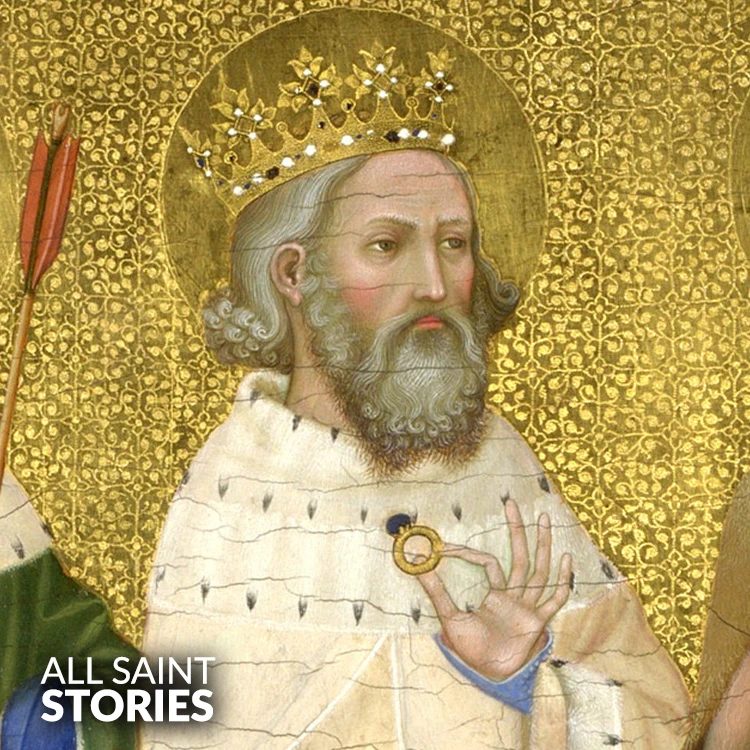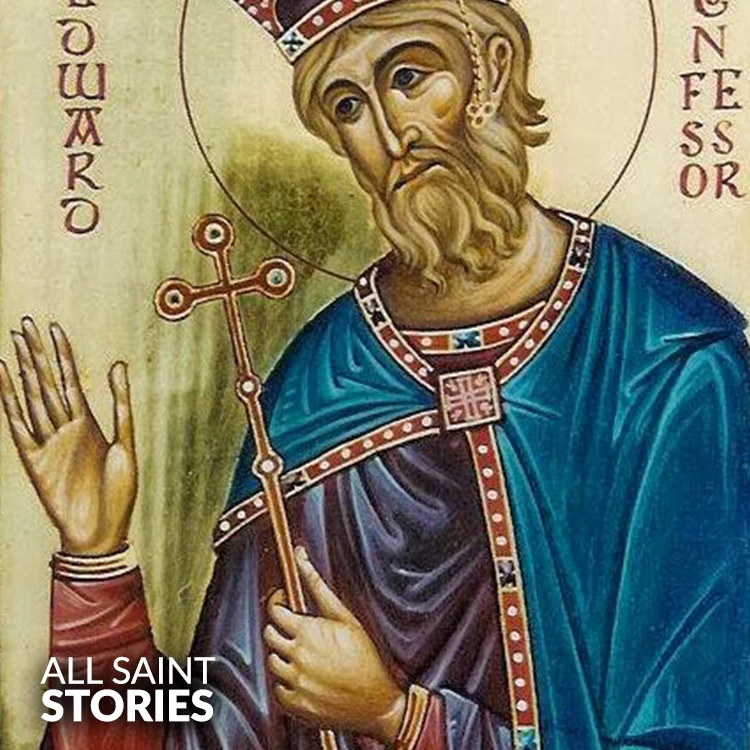St. Edward the Confessor, King and servant of Christ, Pray for us to live with humility and justice. Help us to serve others with a loving heart And lead lives of holiness and peace. Amen.
ST. EDWARD THE CONFESSOR
ST. EDWARD THE CONFESSOR

St. Edward the Confessor was one of the last Anglo-Saxon kings of England, known for his piety, charity, and peace-loving nature. He founded Westminster Abbey and was canonized in 1161. His death in 1066 sparked the Norman Conquest.
Edward the Confessor was born around the year 1003, the son of King Æthelred the Unready and his Norman wife, Emma of Normandy. His early years were spent in exile in Normandy during the Danish conquest of England. This period would shape his character, fostering a deep piety and religious devotion that would become central to his legacy. When he eventually ascended the throne in 1042 after the death of King Harthacnut, Edward brought with him a vision of peace, justice, and religious reform.
His reign is often seen as a relatively peaceful interlude between periods of political strife. Edward was not known for military ambition, but rather for fostering harmony among his nobles and the Church. He sought unity in a kingdom divided by powerful earls and foreign influences. Much of the day-to-day power was held by influential nobles like Earl Godwin and his son Harold, yet Edward managed to maintain authority and earn the respect of his subjects through his integrity and fairness.
One of his most lasting achievements was the construction of Westminster Abbey, which he began in 1045 and was completed shortly before his death. It was the first church in England built in the Romanesque style, and it would become the coronation and burial site for English monarchs. Edward was buried there, and the abbey remains a key symbol of his legacy to this day.
Edward was deeply devout and generous to the poor, often giving away much of his royal income. He was also associated with miraculous healings and acts of mercy, which contributed to his growing reputation for sanctity. Many stories circulated after his death describing miraculous events attributed to him, including healing the sick and curing people by the royal touch.
When Edward died on January 5, 1066, he left no direct heir. His passing marked the end of the House of Wessex and set off a succession crisis. Harold Godwinson claimed the throne, but was quickly challenged by William of Normandy, leading to the famous Battle of Hastings later that year. William's victory ushered in a new era of Norman rule in England.
Despite the political upheaval following his death, Edward's memory endured. He was canonized by Pope Alexander III in 1161, and his relics were translated (moved to a new shrine) in 1163 by St. Thomas Becket. From that time, he was venerated as a saint and even became the patron saint of England for several centuries until St. George took precedence in the 14th century.
Edward's image as a wise and holy king helped to shape the ideal of Christian kingship in medieval Europe. He was remembered as the “Confessor,” meaning he bore witness to the Christian faith through his virtuous life rather than through martyrdom. His shrine in Westminster Abbey became a pilgrimage site, and his cult was particularly important to medieval monarchs who saw him as a model of sanctity and royal piety.
To this day, Edward remains a significant figure in both English history and Christian tradition. His legacy is preserved not just in the grand architecture of Westminster Abbey, but also in the ideals of justice, mercy, and faith that he championed throughout his life.
Video Not Found
The information on this website is compiled from various trusted sources. While we aim for accuracy, some details may be incomplete or contain discrepancies.
If you notice any errors or have additional information about this saint, please use the form on the left to share your suggestions. Your input helps us improve and maintain reliable content for everyone.
All submissions are reviewed carefully, and your personal details will remain confidential. Thank you for contributing to the accuracy and value of this resource.
Credits & Acknowledgments
- Anudina Visudhar (Malayalam) – Life of Saints for Everyday
by Msgr. Thomas Moothedan, M.A., D.D. - Saint Companions for Each Day
by A. J. M. Mausolfe & J. K. Mausolfe - US Catholic (Faith in Real Life) – Informational articles
- Wikipedia – General reference content and images
- Anastpaul.com – Saint images and reflections
- Pravachaka Sabdam (Malayalam) – Saint-related content and insights
We sincerely thank these authors and platforms for their valuable contributions. If we have unintentionally missed any attribution, please notify us, and we will make the correction promptly.
If you have any suggestion about ST. EDWARD THE CONFESSOR
Your suggestion will help improve the information about this saint. Your details will not be disclosed anywhere.
© 2026 Copyright @ www.allsaintstories.com




 English
English
 Italian
Italian
 French
French
 Spanish
Spanish
 Malayalam
Malayalam
 Russian
Russian
 Korean
Korean
 Sinhala
Sinhala
 Japanese
Japanese
 Arabic
Arabic
 Portuguese
Portuguese
 Bantu
Bantu
 Greek
Greek
 German
German
 Dutch
Dutch
 Filipino
Filipino